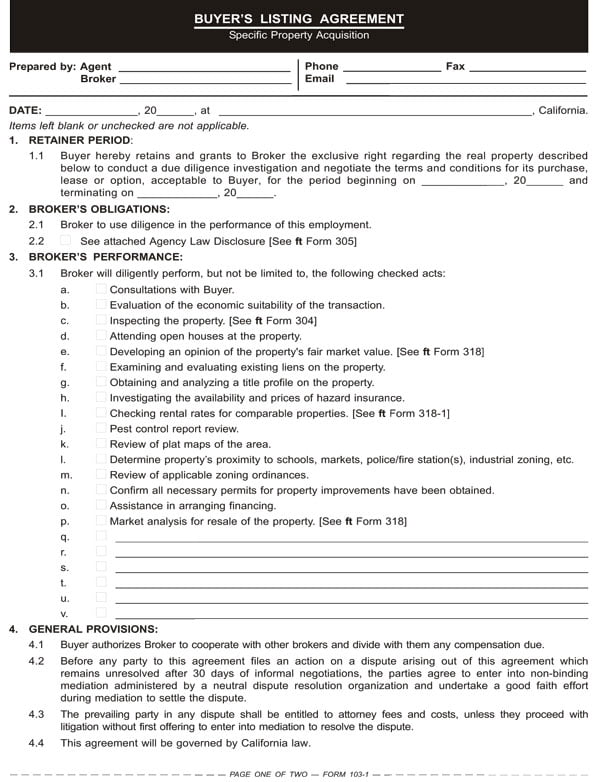The single property fee agreement: the buyer’s agent gets it in writing
In most real estate transactions involving a buyer’s agent, a large portion of the agent’s time spend assisting his buyer involves locating qualifying properties. However, the buyer’s agent need not take this initial step of locating a property when:
- he represents a buyer at a real estate auction;
- the buyer has already identified a property to purchase independent of the agent; or
- the buyer and agent have located a property of interest while they are looking for suitable properties and no employment agreement exists. [See first tuesday Form 103]
Editor’s note – All first tuesday forms may be accessed by currently enrolled first tuesday students within their Student Homepage. first tuesday forms are enabled for digital fill, print and save. Log in with your DRE license number and click “first tuesday Forms Download and Updates.”
When a specific property is already selected by the buyer, the agent enters into a single property fee agreement as a safeguard against lost time and to protect his fee. [See first tuesday Form 103-1]
The single property fee agreement is essentially a buyer’s retainer agreement of the contingency fee variety, in contrast to an advance fee arrangement, setting the fee amount based on whether or not the buyer acquires the property.
Without the need to locate suitable property, the single property fee agreement fully itemizes what specific tasks the agent is to do to receive his fee, such as:
- evaluating the economic suitability of the transaction;
- attending an open house with the buyer prior to auction and inspecting the property;
- obtaining and analyzing a title profile on the property;
- examining pest control reports;
- obtaining plat maps of the area surrounding the property;
- checking the property’s proximity to schools, markets, financial institutions, etc.; and
- developing an opinion of the property’s fair market value. [See first tuesday Form 103-1 §3.1]
If the buyer is already aware of a suitable property, or later discovers a suitable property prior to retaining an agent, the buyer’s agent needs to consider entering into the single property fee agreement with the buyer as soon as possible to ensure he has an enforceable fee arrangement.
Once the agent and buyer select a suitable property to purchase, the agent should not enter into a listing agreement with the seller to establish a contract assuring payment of a fee. Doing so unnecessarily creates a dual agency since the agent will then be representing both the buyer and the seller, taking on an agency duty to each of the opposing parties in the transaction. When the buyer for whom the agent has been locating property wants to acquire a specific property, the agent’s conduct establishes the buyer as his client. Thus, the buyer needs to sign a single property fee agreement to formally employ the agent and assure payment of a fee, whether it is the buyer or the seller who is to pay it. [L. Byron Culver & Associates v. Jaoudi Industrial & Trading Corporation (1991) 1 CA4th 300]
After the buyer signs the single property fee agreement granting the agent the right to collect a fee, the buyer’s purchase offer prepared and submitted to the seller is to include a provision calling for the agent’s fee to be paid by the seller as part of the buyer’s agreement to purchase of the property. [See first tuesday Form 159 §15]
In the instance of a real estate auction, an agent representing a buyer has absolutely no assurance his buyer will be the one to place the highest bid. Thus, a buyer’s agent under a regular buyer’s listing agreement calling for a fee to be paid on the buyer’s acquisition of the property runs the very real risk of receiving nothing in the way of compensation for his time, effort and talent conducting due diligence investigations and assisting in the bidding.
When the buyer does acquire the property as the highest bidder, the fee arrangement for that event is a percentage of the price paid, say 2%, but also could be a lump sum dollar amount, say $6,000. [See first tuesday Form 103-1 §5.1]
However, the buyer’s agent needs to be paid under some formula for handling auction situations when the buyer does not win the bidding contest. If not, the agent will receive nothing for the investment of his time, energy and talent investigating the property and assisting with the bidding – the epitome of sunk costs. Sunk costs are not recoverable under any present or future condition and are lost forever.
When the buyer does not acquire the property, the fee under the single property agreement can call for compensation based on an hourly wage (say, $100) for the agent’s time spent investigating and assisting the buyer prior to completion of the auction. [See first tuesday Form 103-1 §5.3(a)]
Alternatively, when the buyer does not acquire the property, the agent can arrange to be paid a flat lump-sum fee for his services rendered. [See first tuesday Form 103-1 §5.3(b)]
Editor’s note – For a full review of an agent’s role in a private owner’s auction of real estate, see the August 2010 first tuesday article, The private owner auction niche and licensees: Part I.














